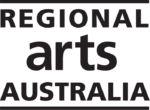Within a basement restaurant where a reading was about to take place, I found myself repeating my name to the doorkeeper. She looked confused and returned to the page of ticketholders. I had a ticket, well, I thought I did, but my name often hid itself to my annoyance. Elena and Josh had already been let through, and not wanting to be left behind, or barred from entry, I began to search through my email inbox. I had not yet found it, when the doorkeeper looked back up, and noticed a green lanyard around my neck. It had the festival colours and titled me “Regional Scribe”.
‘Oh, you’re one of them,’ she said, and let me through.
I felt like a fraud, of course I did. I’m basically a nobody in the writing field, yet I was let in like royalty. Fraud or not, I’m not one to reject special treatment. I found my way into the restaurant, a small warmly lit room, and found my way to Josh and Elena. Up at the front, nestled in a corner was a festival poster displaying an Ibis. Next to it was a microphone. In a moment, the mumbled noise from the audience fell apart. Then the writers spoke.
‘It’s been hard for me to feel like a writer. I knew I was someone who wrote, I knew I might become one, but to me, a writer was one with publications and renown I didn’t have. I’ve since changed my mind, and especially so after the festival.’
Levin Shillam, EWF23 Regional Scribe
It was freezing when we emerged back onto the street. I had been warned about the cold, but even now I wasn’t properly prepared. As we struggled off to find an Uber, we talked about the reading through shivering teeth. It had been excellent; I hadn’t been to one in a while.
There is something irreplaceable in the spoken word, it seems to capture a more direct translation of the author’s intent. In some ways, it’s more passive; we are presented emphasis and intonations rather than constructing it ourselves, but I found the experience thrilling to watch and different from reading alone. I left that night with a book of Dan Hogan’s hyperreal poetry (Secret Third Thing) and several more books on the Wishlist.
When Wednesday came around, I found myself walking alone through Melbourne, guided by the digital gods. I had yet to eat, so I picked up a coffee and sandwich from a nearby café, (the coffee came with a biscuit!) and took it to the dockyards to eat.
There didn’t seem to be an edge to Melbourne, I thought, sitting down on a concrete slab. Even here, there were more skyscrapers across the water. It was both confronting and exciting. Where were the limits to this city? Where was the escape?
Many people – mainly writers – have commented on the solitude of writers. It’s something I’ve gotten used to, there’s not much for literature in Grafton where I grew up, and even at university, people were surprised to hear I wrote. Melbourne didn’t feel like that. It felt as if you could find a writer under every stone. In previous visits, I hadn’t noticed it (though that was a decade ago). It was as if the festival had uncovered the city’s underbelly.
The few days I was down there, I found myself exploring the city on my way to festival events. There was no clear venue for these events, there were a few situated around the Wheeler Centre, in a conference room accessed by a giant elevator. I often found myself talking to my fellow scribes in the foyer of The Wheeler Centre, sharing our experiences of the city and comparing events we had seen. When the workshops rolled around, and we elevated to the room, I found myself comfortably chatting with strangers, talking about family, comedy, and short fiction.
Other times, I found myself wandering into a building in a shopping centre, taking a smaller elevator up five floors to a skinny room cradled by skyscrapers and moving cranes. Down by the dockyards, I got lost in a glass library where a discussion on multi-disciplinary storytelling was held.
To experience the festival, I had to explore Melbourne. And I was exploring Melbourne through the festival, finding the places that contributed to its classification as a City of Literature. It felt like the festival was a product of the city, rather than an anomaly in a town without writing.
It’s been hard for me to feel like a writer. I knew I was someone who wrote, I knew I might become one, but to me, a writer was one with publications and renown I didn’t have. I’ve since changed my mind, and especially so after the festival. With just a green plastic lanyard, people looked at me as if I had a title, admittedly one I had to explain. But even when I forgot it in the hotel room, I still felt justified there. The events weren’t made for the published, but for those who loved writing.
When the clock finally made its way to a quarter past, I got up from my concrete slab and made my way over to the glass library. I had my phone ready to find my ticket, but before I could find it, I was let in. My name was on the list this time. I took a seat next to Josh and faced the front. The talk would begin shortly.
Levin Shillam attended EWF as a participant of Regional Arts Australia’s Regional Scribes program in partnership with EWF. Regional Scribes is an initiative of Regional Arts Australia supported through the Regional Arts Fund, an Australian Government program that supports sustainable cultural development in regional and remote communities in Australia.


Subscribe to our email newsletter: